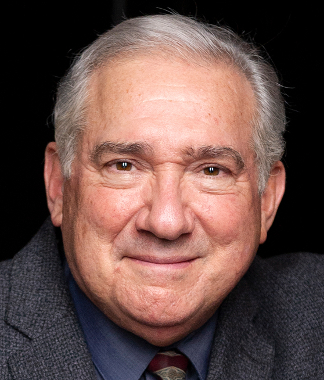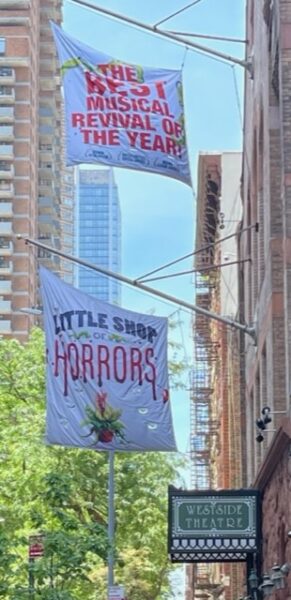STUART NOT SO LITTLE
In August of 1987, Stuart Zagnit took over the role of Seymour, the young botanist in the original production of Little Shop of Horrors at New York’s Off-Broadway Orpheum Theater. In April of 2022, he took over the role of Mushnik, the elderly owner of the floral shop where the Audrey II prospers. It’s the second time in his long, impressive career when he had been cast in two different roles in the same show: the first being as Motel, the young suitor to the eldest daughter Tzeitel in Fiddler on the Roof, and years later as the father Tevye. Recently, I had the pleasure of seeing a matinee of the hit revival Little Shop of Horrors at Off-Broadway’s Westside Theatre/Upstairs, where afterwards Stuart shared many memories of both productions and more.
Walter Hudson & Stuart Zagnit in Little Shop of Horrors (1987). Photo by Peter Cunningham.
Gregory Fletcher / Stage and Cinema: Did you ever imagine coming back to this show as the elderly Mushnik?
Stuart Zagnit: The character of Seymour was a great fit for me, and I loved playing him — in a few productions, actually. I identified with that character for such a long time, but then as the years pass, as they do, it dawned on me I had to let him go. When Michael Mayer, the director, was casting for this current production, I enjoyed the idea of going in for the older shopkeeper Mushnik, but he already had someone else in mind (Tom Allen Robbins) and I chalked it off as a fun thought — but, oh well, not my time.
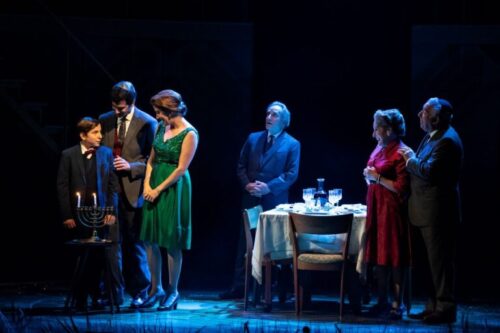 The Company of Roundabout’s Caroline, or Change (2021).
The Company of Roundabout’s Caroline, or Change (2021).
Stuart Zagnit is far right. Photo by Joan Marcus.
GF: Because it was your time to play Grandpa Gellman in the wonderful revival of Caroline, or Change at Broadway’s Studio 54.
SZ: Yes, our invited dress rehearsal was scheduled the night Broadway theaters shut down due to COVID. On that Thursday, March 12th, we were given the option to go ahead with our invited dress, but without our invited guests. The cast took a vote and the majority voted to just pack up and go home, though a few of us went to a bar across the street for a goodbye-for-now drink. On June 1st, Roundabout re-opened Studio 54 for a few hours to allow us to take our personal items out of the dressing rooms, but only if we wanted to. We all fully expected to go back to work in a few months, but that stretched on till Sept. of 2021. We officially opened Oct. 27, 2021 and closed the limited engagement as scheduled on Jan. 9, 2022.
GF: How did Little Shop of Horrors come back around for you?
SZ: I was close to signing my next job, a new play to be performed at 59E59, when my agent called with an unexpected offer to take over the role of Mushnik. No one was more surprised than I was! I decided to sleep on it for 24 hours because I felt bad for the play I’d been negotiating with. I mean, I was literally a day away from signing the contract, but then I woke up the next morning and realized I had to take Little Shop. And so I politely talked to the producer and casting director of the other play, and they were extremely understanding. And here I am.
GF: How did COVID affect Little Shop?
SZ: It opened in October 2019 to rave reviews, [winning the 2020 Drama League, Outer Critics Circle, and Drama Desk Awards for Best Musical Revival] but then March 11, 2020 was its last performance before COVID-19 shut everything down. It reopened in October 2021 and [despite a few performance cancellations due to COVID amongst the company] it’s now enjoying an open-ended commercial run.
GF: And deservedly so, it’s a major hit; the audience loved it — so much cheering and laughs — it was an electric performance I saw at the matinee. And clearly you were destined to be a part of it.
SZ: And what I love is that it feels so much like the energy of the original production, and yet it’s got its own vitality to it. The director, Michael Mayer, achieved quite a feat in that he reimagined the show while simultaneously honoring the spirit of the original. I can hear it in the reactions from the audience. They’re loving the show.
GF: The foundation of the story structure feels so well put together and solid.
SZ: Yes, it’s a beautifully, perfectly structured piece; there’s no fat on the show anywhere. Howard Ashman [book and lyrics] and Alan Menken [music] knew exactly how many jokes to do within the narrative, which then led right up to the next song. There’s nothing extraneous. And the sense of humor and its combination of horror and the comedy is a work of genius — meaning Howard Ashman and his partnership with Alan. They had an amazing partnership, which went on to include all those wonderful Disney productions, [The Little Mermaid, Beauty and the Beast, and Aladdin]. And this show, too, is a major part of their legacy. They just really left a mark, and it’s such a shame that Howard’s no longer with us anymore. [Ashman died in 1991 at age 40 from AIDS-related complications. Additional information: Howard Ashman].
Howard Ashman on the set of Little Shop of Horrors (1982) (Howard Ashman Papers, Music Division, Library of Congress, Washington DC.)
GF: Did you have any connections with Howard in the original production?
SZ: When it was announced the show was closing, it was rather abrupt; none of us were expecting it. But the stock market crashed in October ’87, and the very next week, they posted the closing notice. Apparently, Howard didn’t like to come to closings, so he came the night before, which was Saturday, October 31st. Somehow, we missed each other backstage after the show, but when I came in for the final performance on Sunday, at my dressing station in the dressing room was a handwritten note from Howard. On the front, it said, “Stuart — As I can’t be there Sunday for closing, I came tonight. Seem to have missed you backstage, but I wanted to say a big thanks for everything. You’ve helped us go out in style and I’ll always be grateful for your work. Best always, Howard (Ashman)” I have it framed; it’s one of my treasures.
A few years later, I was doing a show at the York Theater on East 54th St. [called the Theater of Saint Peter’s Church at the time]. And I happened to see him in the hallway — just a chance meeting. We had a lovely chat, and then shortly after he got sick and passed away. Heartbreaking. Such a talent. He’s a big part of why I have such a connection to the show; it feels very personal and is why I feel very protective of the material and honored to represent it. In my Playbill bio, I dedicated my performance to my wife and son, to my parents, and to Howard.
Fyvush Finkel and Stuart Zagnit
GF: And to Fyvush. The actor?
SZ: Yes, the great Fyvush Finkel, who came out of the Yiddish theater and played opposite me as Mushnik, the role I’m playing today. Little Shop launched him into doing a lot of award-winning film and TV work. He had an amazing career. At the time, I thought to myself, he’s the guy I wanted to emulate because, through his example, it ain’t over till it’s over. I loved working with him.
GF: Who directed the original production?
SZ: Howard Ashman, but by the time I was put into the show, it was the stage manager’s job to teach all the blocking and intentions of the original direction. It was an easy fit for me because I had the chance to play Seymour once before, a regional theater in Birmingham, Michigan — the theater doesn’t exist anymore, but I played opposite Marsha Waterbury who later took over the role of Audrey in New York after Ellen Greene, so I had it under my belt by the time I did it at the Orpheum.
GF: But for the revival at Westside Theatre/Upstairs, I’m guessing you didn’t have the prep time for Mushnik like the out-of-town production gave you for Seymour. How much rehearsal did you get before your one put-in rehearsal?
SZ: We have some great stage managers here [Ryan Gohsman and Sara Sahin]. Also, one of the urchins [Jana Djenne Jackson] is the dance captain, so they were extremely helpful, welcoming, and supportive. I had eight rehearsals that ran 2 to 3 hours each, various days over three weeks. Then my ninth rehearsal was my put-in, and then I opened the next Tuesday night. We also have a really incredible wardrobe staff [Carmella Lauer and Shane Lacoss]. When I exited off-stage, I didn’t have to think about what to put on next; they were standing there waiting for you with the next needed costume pieces. They take the pressure off the actor, so you can focus on the next scene. Everyone backstage is invaluable to what goes onstage.
GF: In the eight rehearsals you had, how quickly did it the show come back to you?
SZ: I have to say that by the time I was put in, I was pretty much 99% there, and I got through that first performance without a hitch. Though it was nerve-racking to say the least. A show that’s up and running is like a running train, and when you’re the new person, you need to jump on at the speed the train is moving. Under no circumstance do you want to slow the train down. That would feel horrible, so the pressure you have is keep that pace moving. I watched the show at least once a week to see how it moved, so I knew the rhythms of the show as it moved forward. Then with each performance after my first, I could relax a little bit and enjoy it more and more. By Friday night, I was having a good time.
GF: Did they ask you to re-create the former actor’s performance of Mushnik?
SZ: Not at all. Except for the blocking, of course. The stage manager was very supportive, and then when the director came after I opened, he gave me some notes to incorporate. Then the following week, Skylar [Astin] was put-in to play Seymour. Michael and the lead producers were there, and they seemed over the moon. It really felt good to get that kind of approval, so yes, I was happy.
Skylar Astin, Tammy Blanchard, Stuart Zagnit and Andrew Call in Little Shop of Horrors (2022). Photo by Emilio Madrid.
GF: As if it wasn’t challenging enough, you had to go from one Seymour [Conrad Ricamora] to another. And in July, you’ll have another Seymour when Rob McClure replaces Skylar. But I guess that’s theater when any long run is involved. I noticed at today’s performance Evan Alexander Smith was on for Christian Borle. As well as Jana Djenne Jackson for Khalifa White. Both were amazing and so talented, but I was particularly impressed with how Evan took on such a dark character — a sadistic dentist who beats up his girlfriend. With the #MeToo movement, I wondered prior to seeing the show if we’d be able to laugh at such violence, but Evan from his first moments onstage made us laugh and never stopped all the way to [spoiler alert] his hilarious death scene. For me, dark comedy is the hardest to pull off, and he succeeded with so many laughs — and yet the darkness was ever present at the same time.
SZ: What an amazing trooper he is; I agree, Evan really nailed it, not to mention playing multiple roles with constant costume changes. And he hadn’t performed that track in a very long time. He also covers Seymour.
GF: Oh, wow, with his height? That’s a very tall Seymour.
SZ: We have two puppeteers who are also very tall, and they have to squeeze into the smallest places. Eric Wright and Teddy Yudain are so amazing and talented!
Stuart Zagnit & Kathy Meloche Ricardo in Little Shop of Horrors (1987). Photo by Peter Cunningham.
GF: How have the plant puppets changed from the original production?
SZ: The plant was originally manipulated solely by the strength of the puppeteer. The smaller ones seem essentially the same, but the largest plant at the end of act two has a counter-weight system now, which takes some of the pressure off the puppeteer. But it’s still a very physical job — and hot and dark, but at least it’s not as heavy to operate as it once was.
GF: Do you have much in common with your character Mushnik?
SZ: Well, there’s nothing contained with him. What you see is what you get. And he’s a creature of his time. And we all struggle to make ends meet. When success comes his way, he doesn’t even realize what’s behind it. He just finally enjoys being able to pay his bills and living decently for the first time in his life. What was the question?
GF: Ha! I asked if there were any similarities between working on Broadway and Off-Broadway?
SZ: Eight performances a week. There are more differences than similarities. The money is very different. The number of dressing rooms is much less. We have two: one for the men; one for the women. Less space backstage, smaller stage, smaller audience, smaller budget. But the work itself is the same — the focus, the commitment, the two show days.
Stuart Zagnit in Little Shop of Horrors (1987).
GF: What do you do between shows?
SZ: I get something to eat, take a little snooze, and do it all again. Two show days are a great workout.
GF: Has this been a two-show tradition all along your career?
SZ: When I was doing Seussical, I’d hop on the subway and ride back to Brooklyn, spend time with my wife and son, have dinner, then jump back on the subway and return to Manhattan for the evening show. I have great stamina, but I no longer have the energy for that. Thankfully, neither my wife nor son want me to come home. [Laughter] Aging is knowing you have limitations, and I think it’s important to acknowledge and act accordingly.
GF: If you could cast yourself in anything after this show closes, what would it be?
SZ: I’d love another chance to play Tevye again in Fiddler; I’d take that in a heartbeat. But I’m also open to new experiences. I’ve been doing more TV guest spots than ever before, which I love.
Stuart Zagnit in Tevye in Fiddler on the Roof at Syracuse Stage.
GF: I recently caught you on “The Marvelous Mrs. Maisel” and enjoyed it very much. Was the bar mitzvah scene in the synagogue all shot in one day?
SZ: Two days, actually. That was an amazing experience; they’ve really got it together. It was like working on a feature film; I was so impressed. And it was doubly fun for me because all the main characters were in the congregation watching me, so I felt like the center of attention. I had a lot of fun interaction with Tony Shalhoub’s character [Abe Weissman], and the scene was really exciting because it was the culmination of the episode. Everything led up to that moment, and it was a rather long scene.
GF: Did you have much rehearsal beforehand?
SZ: I read it a few times on zoom with the casting directors, and they gave me a couple of adjustments. I was thrilled when I booked it.
A Stuart Zagnit selfie on the set of Little Shop of Horrors (2022)
GF: How much time between the zoom call and booking it?
SZ: A few weeks. I had the script almost a month before shooting, and I was off book by the time I got there, but I didn’t meet or talk to anybody in the show until the morning of the shoot. Three months later, they called me back because they wanted to adjust some dialogue. They had a shot of me with my back to the camera, so it was easy to change the dialogue. Then it took a year before it was released. I would love to do more TV or film. So far, I’ve done guest spots on “Law and Order,” “The Good Wife,” “The Blacklist,” “30 Rock,” “Elementary,” “Blue Bloods,” among others.
GF: But I bet you don’t get that theater energy like you got from today’s audience. They just ate it up with cheering and laughter.
SZ: Yes, one of the gifts of doing live theater. When the audience is affected by a good show, you can hear them and feel them — it’s a wonderful sensation. When I get [spoiler alert] eaten by the plant, if the audience doesn’t applaud, I’m really disappointed. Today, we got a really big hand, and I loved it.
GF: And a laugh, too, when the plant slurped at the exact moment you pulled your arm in. It was sick and hilarious at the same time. Looks like you’ll be enjoying yourself here.
SZ: And I hear they’re selling tickets into January 2023.
GF: Hopefully, the stock market won’t crash again.
SZ: I will gladly stay with it as long as they want me.
GF: Where did you grow up and go to school?
SZ: Spotswood, New Jersey, and I went to Montclair State College, which is now called Montclair State University, where I majored in speech and theater.
GF: Emphasizing in musical theater?
SZ: At the time, I thought musical theater was strictly for singers. It wasn’t until I did a school production of The Fantasticks that I realized some gratifying, meaningful acting was involved, and that’s when I was like—I should do this.
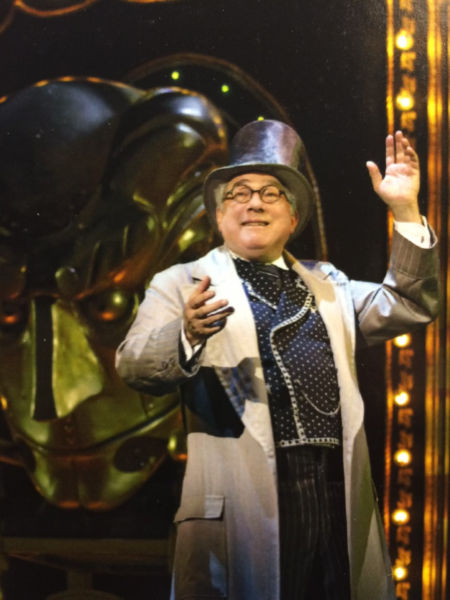 Stuart Zelnick in the national tour of Wicked.
Stuart Zelnick in the national tour of Wicked.GF: And you’ve been working in theater ever since: Six Broadway shows so far, [Caroline, or Change; Newsies, Seussical, The Wild Party, The People in the Picture, and Grinch; Regionally in Fiddler on the Roof, The Producers, The Sound of Music]. In the national tours of Wicked, Into the Woods, Crazy For You, Applause, and several Off-Broadway productions including Little Shop of Horrors twice!
SZ: Hearing you read it off, it sounds like I’ve been very lucky. I have a lot to be grateful for.
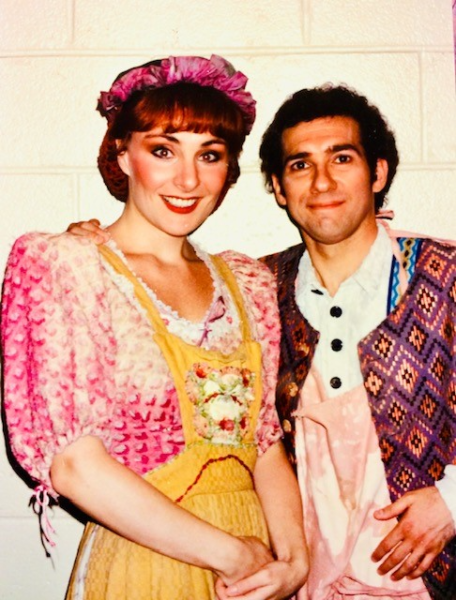 Judy McLane & Stuart Zelnick in the national tour of Into The Woods.
Judy McLane & Stuart Zelnick in the national tour of Into The Woods.
GF: There are working actors who have 15-minutes of fame, but then there are ones who steadily work for decades. I’d rather be in the second group.
SZ: I’ve lost a lot of sleep over wanting those 15-minutes of fame, but I’ve learned that you can’t compare your path to those around you. I try to stay out of the way and let life happen. This has been the toughest thing to learn. To let your life happen; don’t try to control things too much because that only produces angst.
GF: Let go, let God.
SZ: Don’t let yourself get in the way. Get out of your way and let life happen. For years, many of my friends had already been on Broadway, and I couldn’t get arrested for a TV spot, no matter how hard I pushed. I’d beat myself up and get to the point where I said, “Maybe it’s just not gonna happen for me. And maybe I should be okay with that, you know?” And by…getting out of my way, it happened. The more I stop fretting about it, and do the work, the work keeps coming. I’m feeling very grateful to the universe; this is a really wonderful time. And there’s more to come.
GF: As you learned from Fyvush Finkel.
SZ: Yes, it ain’t over till it’s over.
